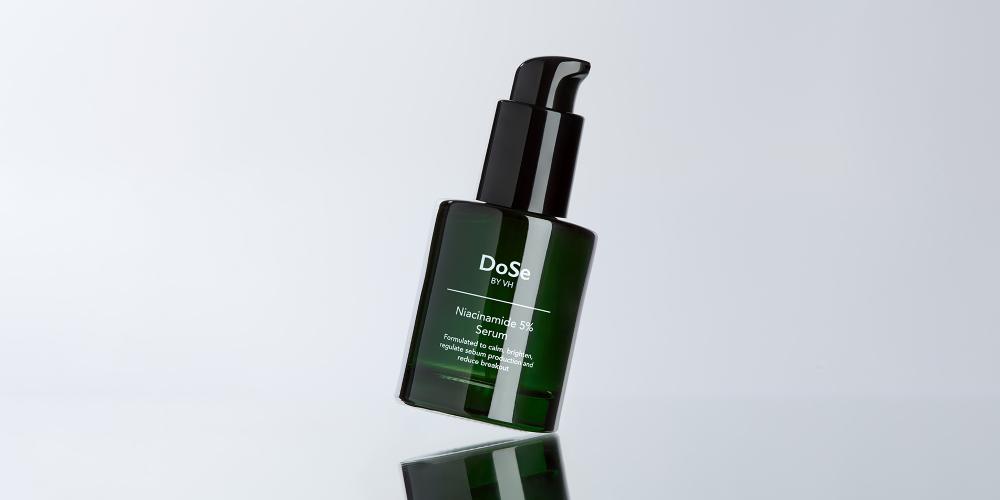
The Benefits of Using Niacinamide As Part Of Your Daily Routine
Niacinamide, also known as vitamin B3 is a very stable, water-soluble vitamin which offers a wide range of topical benefits for all skin types, making it a staple skincare ingredient in many people's daily regimes. Tolerated by most skin types and effective for many skin concerns Niacinamide, is a versatile building block ingredient helping to control oil production, visibly minimise enlarged pores, tighten lax pores, improve uneven skin tone, soften fine lines and wrinkles, diminish dullness, stimulate ceramide production and strengthen a weakened skin barrier.
With the potential to change your skin for the better, Niacinamide has an important role to play in helping clear skin which is prone to acne, by regulating sebum production, hence reducing breakouts. Several studies indicate that niacinamide helps reduce the severity of moderate inflammatory acne. Niacinamide appears to regulate oil production which helps to get excess oil production under control.
Niacinamide may also enhance the efficacy of products designed for blemished skin, dry and sensitive skin as well as those skincare products intended as an anti-wrinkle treatment. Niacinamide has been shown to increase protein synthesis, boost collagen and elastin production, enhance ceramide production and on ageing skin helps improve the surface and texture whilst helping to smooth out wrinkles.
Skin requires hydration and also needs a healthy lipid barrier in order to function correctly. The function of a healthy lipid barrier is to help retain moisture and prevent dehydration. Niacinamide helps to renew and restore the surface of the skin by encouraging the skin’s natural production of skin-strengthening ceramides. Ceramides are responsible for ensuring that trans-epidermal water loss does not occur too quickly by holding onto water in the skin. By enhancing the skin’s production of ceramides, Niacinamide helps to reduce skin sensitivity, tightness and flaky, dry patches.
But the benefits of introducing Niacinamide do not end here. As we age skin becomes more prone to textural irregularities and unwanted pigmentation. Niacinamide does not bleach skin but works to block the accumulation of melanin in the skin’s surface helping to prevent skin darkening and break up existing discolouration for a more even skin tone. Niacinamide is so effective that it is even used to treat melasma which is a condition with marked facial hyperpigmentation.
Not only does niacinamide greatly improve the skin’s ability to protect itself from external aggressors and reduce the impact of environmental damage meaning it can improve the skin barrier, it also plays a role in helping the skin to repair signs of past damage. This means a dull complexion appears brighter and older complexions, with continued use, may appear more youthful. Using a niacinamide serum daily helps reduce inflammation and therefore improve skin structure and prevents redness, blotchiness and skin sensitivity.
Dose with any product, Niacinamide can be happily used alongside all other serums and treatments including retinols, HAs, AHAs, BHAs, Peptides, vitamin C and all types of antioxidants.
The topical use of a niacinamide serum is a must-have product in any beauty regimen to help achieve a more even-toned, radiant and younger looking complexion.
Shabir recommends DoSe by VH Niacinamide 5% Serum
References for this information:
A Double-Blind, Randomized Clinical Trial of Niacinamide 4% versus Hydroquinone 4% in the Treatment of Melasma Experimental Dermatology, February 2019, Supplement 1, pages 15-22, July 2011, ePublication
Development of Niacinamide/Ferulic Acid-Loaded Multiple Emulsion and Its In Vitro/In Vivo Investigation as a Cosmeceutical Product, March 2022, ePublication
Shalita et al, International Journal of Dermatology, 1995, 34 (6):434-437
Khodaeianii et al, International Journal of Dermatology 2013, 52:999-1004
Oblong J. 2014 DNA Repair 23, 59-63